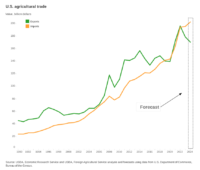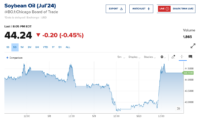Bloomberg's Clarice Couto reported this past Friday that "a surprising tax change in agriculture powerhouse Brazil has the potential to make soy grown in the world’s largest bean exporter less…
USDA’s Trade Aid Package
Recent news articles have discussed USDA’s trade aid package, as well as the potential impacts of ongoing trade tariffs on U.S. farm goods. Today’s update provides an overview of several of these articles.
Wall Street Journal writer Jesse Newman reported late last week that, “The Trump administration has started compensating U.S. farmers for damage tariffs are doing to their business.
“Many farmers say the payments won’t make up for lost sales to China and other foreign markets they were counting on to buy the huge amounts of crops and meat being produced across the Farm Belt.
“Bumper corn and soybean harvests and record pork production have pushed down prices for agricultural commodities. U.S. farm income is expected to drop 13% this year to $66 billion, according to the Department of Agriculture, extending a yearslong slump in the agricultural economy.”
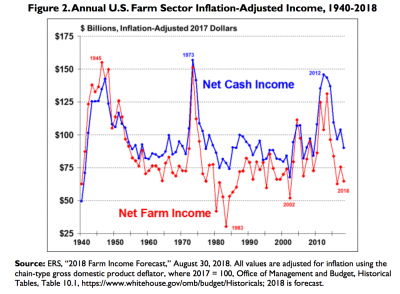
The Journal article pointed out that, “The USDA in August said it would pay farmers nearly $5 billion to offset losses from global trade disputes. Major U.S. trade partners including China, Canada and Mexico have applied tariffs to billions of dollars’ worth of U.S. agricultural exports in retaliation for tariffs imposed by Washington. The U.S. and China vowed last week to put more tariffs on each other’s goods.
The USDA said it has paid $35 million to farmers so far, especially in Iowa, Kansas, Illinois, Indiana and Wisconsin. Nearly 49,000 farmers have applied for the aid.
Ms. Newman noted that, “Trade-related losses to the U.S. pork industry are expected to total more than $2 billion this year, said Iowa State University economist Dermot Hayes.”
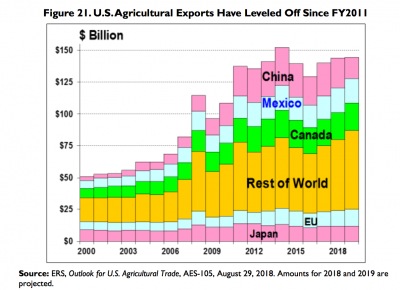
The article added: “The White House referred a request for comment to USDA, which has said the aid isn’t intended to make farmers whole, but rather to provide short-term relief while the Trump administration works to secure long-term trade deals that benefit the entire economy, including agriculture.”
Financial Times writer Gregory Meyer reported Sunday that, “Starting on Monday, Washington plans to buy $1.2bn worth of American-grown foodstuffs over the next year to prop up prices for farmers suffering from new tariffs on their crops in China and other trading partners. The produce will be donated to food banks and other need-based groups.”
The FT article pointed out that, “The purchases will increase by more than 50 per cent the amount the US agriculture department typically procures for donation. In fiscal 2017 its Agricultural Marketing Service paid $2.2bn for 2.4bn pounds of food, records show.”
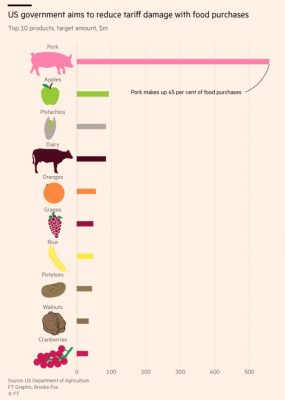
Mr. Meyer added: “Feeding America, a network of 200 food banks, estimated that distributing all the extra food will cost $300m-$400m and has asked Congress and the agriculture department for more funding.”
Bloomberg writer Deena Shanker reported Friday that, “Attending the Global Food Forum in New York this week, [Beth Ford, chief executive officer of Minnesota-based agriculture cooperative Land O’Lakes Inc.] said the Trump administration’s compensation package falls short of the losses being incurred by producers, many of whom can’t simply wait for tariffs to be lifted.
“‘The bean farmers are going to get $3 billion but it doesn’t make up for the $6 or $7 billion loss that they’ve already seen,’ Ford said, referencing the $3.6 billion for soy farmers included in the short-term aid package the U.S. Department of Agriculture announced in August.”
Meanwhile, Bloomberg writers Deena Shanker and Mario Parker reported Thursday that, “U.S. soybean growers who are starting to harvest what’s predicted to be a bumper crop probably will look to weather the trade war with China by stashing away the oilseed, according to agribusiness giant Bunge Ltd.
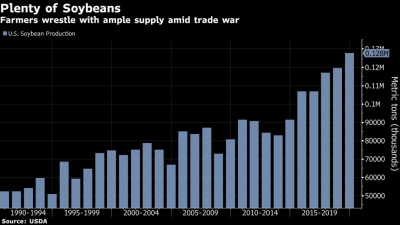
“‘Anybody who can store will do it,’ Chief Executive Officer Soren Schroder said Thursday from a conference in New York. Bunge is the top oilseed processor.”
And Bloomberg writers Kevin Varley and Shruti Singh reported Friday that, “American soybean inventories were up 45 percent on Sept. 1 from a year earlier as stockpiles more than doubled in Illinois, the top producer, the U.S. Department of Agriculture said in a report on Friday.”
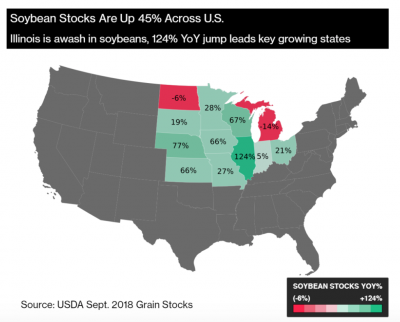
Bloomberg writers Mario Parker, Isis Almeida, and Alix Steel reported Tuesday that, “China has committed not to buy American soybeans because of the trade war, but also because of pride, [Cargill Chief Executive Officer David MacLennan] said. The head of the largest privately-held U.S. company was among a group of leaders that met with Xi Jinping before the trade war deepened over the summer and the Chinese President said his country wouldn’t back down, he said.”
#Iowa Agricultural Prices Report: The August 2018 average price received by #farmers for #soybeans, at $8.38 per bushel, was down $0.77 from the July price and $0.67 below the August 2017 price, @usda_nass pic.twitter.com/C4aAANWXxx
— Farm Policy (@FarmPolicy) September 27, 2018
Wall Street Journal writers Jesse Newman and Jacob Bunge reported Thursday that, “Leaders of the U.S. agricultural industry are girding for an extended trade battle with China, which is already taking a toll on U.S. farmers and food companies.”
And as this battle goes on, some see increased export opportunities for Canadian producers, as well as increased production and exports of some agricultural commodities from a resurgent Russia.
Nonetheless, Reuters writers P.J. Huffstutter and Dominique Patton reported Thursday that, “Taiwanese trade officials and business leaders signed a letter of intent on Thursday to purchase as much as 3.9 million metric tons of soybeans from farmers in Minnesota and Iowa over the next two years, Minnesota Governor Mark Dayton said in a statement.”
The article noted that, “Taiwan’s imports from the U.S. have surged this year, with U.S. soybean arrivals increasing 80 percent above the average for 2013-17 in the first seven months to 1.2 million tonnes, according to USDA data.”
The U.S Agriculture @SecretarySonny Perdue joins us on #CheddarLIVE to discuss the current status of the Farm Bill extension, and the $12 billion in aid being rolled out to farmers that have been adversely affected by the trade war with China. pic.twitter.com/vvCwVBgXhz
— Cheddar (@cheddar) September 26, 2018
And Secretary of Agriculture Sonny Perdue discussed trade issues last week on Bloomberg television, that interview can be viewed here: “China ‘Will Be Back’ to U.S. Markets, Agriculture Sec. Perdue Says.”






